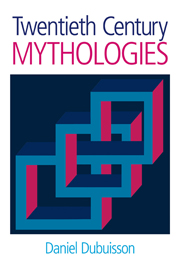Book contents
- Frontmatter
- Epigraph
- Contents
- Foreword by Professor Robert A. Segal
- Preface
- Abbreviations
- Introduction: History and comparative epistemology
- Part I Georges Dumézil, or Society
- 1 The Indo-European background
- 2 The first comparative mythologies
- 3 Durkheim, Mauss, Bourdieu, and Dumézil
- 4 The 1950s: a reorientation
- 5 Comparative and structural evidence
- 6 The new comparative mythology
- Addendum I Theory, history, and the limits of Dumézil's comparativism
- Addendum II Does a Dumézilian theory of religion exist?
- Part II Claude Lévi-Strauss, or the Mind
- Part III Mircea Eliade, or the Sacred
- Conclusion: Modern theories of myth and the history of Western thought
- Bibliography
- Index
2 - The first comparative mythologies
from Part I - Georges Dumézil, or Society
- Frontmatter
- Epigraph
- Contents
- Foreword by Professor Robert A. Segal
- Preface
- Abbreviations
- Introduction: History and comparative epistemology
- Part I Georges Dumézil, or Society
- 1 The Indo-European background
- 2 The first comparative mythologies
- 3 Durkheim, Mauss, Bourdieu, and Dumézil
- 4 The 1950s: a reorientation
- 5 Comparative and structural evidence
- 6 The new comparative mythology
- Addendum I Theory, history, and the limits of Dumézil's comparativism
- Addendum II Does a Dumézilian theory of religion exist?
- Part II Claude Lévi-Strauss, or the Mind
- Part III Mircea Eliade, or the Sacred
- Conclusion: Modern theories of myth and the history of Western thought
- Bibliography
- Index
Summary
If Dumézil has been credited with founding the “new comparative mythology,” it is no doubt because his work opposed that of his predecessors. We must not forget that the discipline, which developed in the wake of the comparative grammar of Indo-European languages, is only approximately oneand-a-half centuries old, and had existed for just over seventy years when Dumézil began his career. In addition we must determine just how his work differed from earlier efforts, what new points of view it brought to bear, what original principles it advanced in the course of its theoretical elaborations (and what level of conceptualization it attained by dint of the latter), and what new perspectives it opened up. And we must recognize what ancient prejudices it took up and modified, what conceptions (elaborated elsewhere) it adopted and transformed, and where the work was tacit in matters of convention and respect for historical context. Even more importantly, we must ask what epistemological problems tied to its own existence or definition it was incapable of either seeing or solving.
Two men were particularly important to Dumézil's at the start of his career. The first was Michel Bréal (1832–1915), the French disciple of the great Max Müller (1823-1900). Bréal, whose grandson was Dumézil's classmate in high school, took him under his wing from 1912.
- Type
- Chapter
- Information
- Twentieth Century Mythologies , pp. 17 - 24Publisher: Acumen PublishingPrint publication year: 2006



